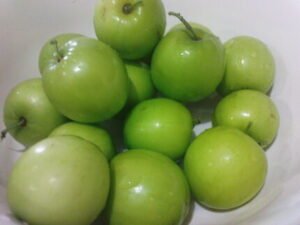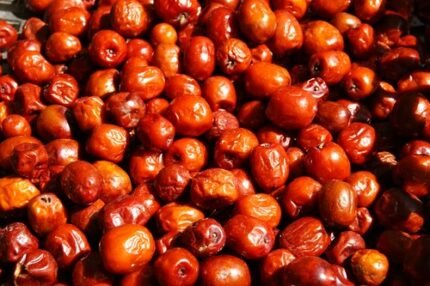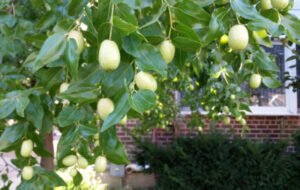Medically reviewed by Dr. Ramesh Gaddam, M.D. — Written by Sumalatha, D.N.H.E
“Ber fruit” refers to the fruit of the ber tree, which is also known as the Indian jujube (Ziziphus mauritiana). The ber tree is a small, drought-resistant tree that is native to South Asia but has also been cultivated in other parts of the world. The fruit is small, round or oval, and typically yellow to reddish-brown when ripe. Ber fruits are often eaten fresh, and they have a sweet and tangy flavor.
Ber fruit Nutrition
Ber fruit (Indian jujube) per 100 grams:
| Nutrient | Amount per 100g |
|---|---|
| Calories | 79 kcal |
| Carbohydrates | 20.23 g |
| Protein | 1.2 g |
| Fat | 0.39 g |
| Dietary Fiber | 6.2 g |
| Vitamin C | 69.4 mg |
| Vitamin A | 69 IU |
| Vitamin K | 0.5 µg |
| Potassium | 250 mg |
| Calcium | 37 mg |
| Iron | 2.23 mg |
| Magnesium | 37 mg |
| Phosphorus | 23 mg |
| Zinc | 0.32 mg |

Ber Fruit Benefits
1. Rich Source of Vitamin C:
Ber fruit is a significant source of vitamin C, providing 69.4 mg per 100 grams. Vitamin C is essential for a healthy immune system, and it also acts as an antioxidant, helping protect cells from damage.
2. Dietary Fiber Content:
Ber fruit is relatively high in dietary fiber, with 6.2 grams per 100 grams. Dietary fiber supports digestive health, aids in regular bowel movements, and can help manage weight by promoting a feeling of fullness.
3. Antioxidant Properties:
Ber fruit contains various antioxidants that can help combat oxidative stress and reduce the risk of chronic diseases. Antioxidants are essential for maintaining overall health.
4. Potential Digestive Benefits:
The dietary fiber in ber fruit can promote healthy digestion by preventing constipation and supporting a balanced gut microbiome.
5. Nutrient Rich:
In addition to vitamin C, ber fruit contains essential minerals like potassium, calcium, iron, magnesium, and zinc, which are necessary for various bodily functions, including bone health and muscle function.
6. Traditional Medicinal Uses:
Ber fruit has been used in traditional medicine for its potential benefits in treating conditions such as coughs and sore throats. Its anti-inflammatory properties are also valued in some traditional healing practices.
7. Natural Sweetness:
Ber fruit has a naturally sweet and tangy flavor, making it a healthier alternative to refined sugars or processed sweets when you have a craving for something sweet.
8. Low in Calories:
Ber fruit is relatively low in calories, with only 79 kcal per 100 grams, making it a good option for those looking to manage their calorie intake.

Ber Fruit Side Effects
1. Allergic Reactions:
Some individuals may be allergic to ber fruit. Allergic reactions could manifest as skin rashes, itching, swelling, or, in severe cases, difficulty breathing. If you suspect an allergy, discontinue consumption and seek medical attention.
2. Diarrhea and Digestive Discomfort:
While ber fruit’s dietary fiber content can support healthy digestion, consuming it in excess may lead to digestive discomfort, including diarrhea or stomach cramps. Moderation is key to avoid such issues.
3. Unripe Ber Fruit May Cause Constipation:
Unripe ber fruit can be astringent due to the presence of tannins. Consuming unripe fruit in excess may lead to constipation or a dry feeling in the mouth.
4. Dental Issues:
Ber fruit can be acidic, and excessive consumption may erode tooth enamel or lead to dental sensitivity. It’s advisable to rinse your mouth with water or brush your teeth after eating to minimize this risk.
5. Interaction with Medications:
If you are taking specific medications, especially blood-thinning medications, ber fruit’s vitamin K content might interfere with the medication’s effects. Consult with your healthcare provider if you have concerns about potential interactions.
6. Weight Gain:
While ber fruit is a healthy option, consuming it excessively, especially when combined with a diet high in other sugary or calorie-dense foods, could contribute to weight gain. Be mindful of portion sizes.
7. Risk of Over consumption:
As with any food, it’s essential to consume ber fruit in moderation. Overconsumption of any food can lead to imbalances in your diet, potentially impacting overall health.
It’s important to remember that most people can enjoy ber fruit without experiencing any adverse effects. However, if you have specific health concerns or dietary restrictions, it’s advisable to consult with a healthcare professional or a registered dietitian before making significant changes to your diet or consuming large quantities of any fruit or food
Ber Fruit uses

1. Culinary Uses:
Ber fruit is commonly consumed fresh, offering a sweet and tangy flavor. It is also used in various culinary applications, such as making jams, jellies, and chutneys. In some regions, ber fruit is used to prepare beverages and desserts, adding a unique and delightful taste to the dishes.
2. Medicinal Uses:
Ber fruit has a history of traditional medicinal uses. It is believed to have properties that may help alleviate common health issues. For example, it has been used to soothe sore throats and coughs due to its potential anti-inflammatory properties. Additionally, some traditional healing systems use ber fruit for its digestive benefits.
3. Nutrient Supplement:
The high vitamin C content in ber fruit makes it a valuable source of this essential nutrient, which supports the immune system and overall health. Including ber fruit in your diet can help ensure an adequate intake of vitamin C.
4. Potential Antioxidant Benefits:
The antioxidants found in ber fruit, such as flavonoids and polyphenols, may help combat oxidative stress and reduce the risk of chronic diseases. Including ber fruit in your diet can contribute to your overall antioxidant intake.
5. Jam and Jelly Production:
Due to its naturally sweet and tangy taste, ber fruit is commonly used to make jams and jellies. The fruit’s natural sugars make it an excellent base for preserving the fruit’s flavor and extending its shelf life.
6. Beverages:
In some cultures, ber fruit is used to prepare beverages, including juices and teas. These beverages often retain the fruit’s distinctive sweet-tangy flavor, offering a refreshing and nutritious option.
7. Snacking and Dried Berries:
Ber fruit can be dried, turning it into a convenient and nutritious snack. Dried ber berries are enjoyed in many parts of the world as a tasty and portable treat.
8. Pickles and Condiments:
Ber fruit can also be used to make pickles and condiments, adding a unique and flavorful element to various dishes. These pickles and condiments are often used to enhance the taste of meals.
9. Traditional and Cultural Uses:
In some cultures, ber fruit holds special significance and is used in traditional rituals, ceremonies, and celebrations. It is often included in offerings and feasts during festivals and cultural events.
Medically reviewed by Dr. Ramesh Gaddam, M.D.

General Physician, Diabetologist, and Critical Care Specialist.
Discover more from Health Build-Up
Subscribe to get the latest posts sent to your email.

